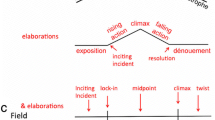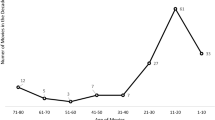Abstract
Walkerdine's ‘Video Replay’ paper analysing a working-class family's reactions to watching a video of Rocky II was pathbreaking: it underlined power relations implicit in participant observation, challenged the differential between ‘high’ and ‘low’ culture and developed a framework for understanding viewers’ engagement with film. The paper also makes a transcript of the video-viewing available for subsequent analysis. This commentary rereads the transcript in the light of the contemporary context and my affective responses to the material. The reading draws attention to identifications at play among family members, film characters and researcher, as well as to the ways this family's establishing a harmonious domestic scene allowed violent material to be viewed in relative safety. Fantasy is perceived as having constitutive effects. This reading moderates some of the deterministic implications of focusing primarily on signification.
Similar content being viewed by others
Notes
It is a pleasure and a privilege to comment on this key article by Valerie Walkerdine, whom I have known as a colleague and friend for many years. I am very grateful to the editors of this journal for the opportunity.
For example, Philip French (2010) described the film as ‘grim yet ultimately affirmative’. See Paul Byrnes (2010) for a discussion of the ‘long dishonourable history of the depiction of blacks in American culture’; and Mark Lawson (2010a) for insights into the film's relation to Obama's presidency and other issues.
For a discussion of casting ‘real people’ and ‘real professionals’ in acting roles, see Mark Lawson (2010b).
In May 2010 for the first time the UK General Election was preceded by three television debates between the leaders of the three main political parties. Overall, the TV debates were convincingly won by Nick Clegg, leader of the minority party, the Liberal Democrats. The election results confounded many commentators because a massive swing to the Liberal Democrat Party did not follow Clegg's success. In fact Liberal Democrat seats were slightly reduced. Thus performance on TV does not appear to have displaced traditional voting patterns when it came to the ‘reality’ of the election itself.
After completing my analysis I noticed that I refer to members of the family in various ways, as mother, father, Mum, by Christian name, and so on, as well as by names denoting the adults’ married status, as in Mr and Mrs Cole. By contrast, Walkerdine refers to the adults as Mr and Mrs Cole throughout. I have kept to the names I chose spontaneously as I think doing so reflects the family and parenting relationships/dynamics with which I was identifying or attuned.
References
Blackman, L. and Venn, C. (2010) Affect. Body and Society 16 (1): 7–29.
Byrnes, P. (2010) Precious. Sydney Morning Herald 8 February: 16–18.
French, P. (2010) Precious. The Observer Review, London. 31 January, p. 14.
Freud, S. (1900, 1953) The Interpretation of Dreams. Standard Edition, 4–5. London: Hogarth Press.
Freud, S. (1921, 1955) Group psychology and the analysis of the ego. Standard Edition, 18. London: Hogarth Press, pp. 69–143.
Hollway, W. (2008) Psychoanalytically informed observation. In: L.M. Given (ed.) SAGE Encyclopedia of Qualitative Research Methods. Thousand Oaks, CA: Sage.
Lawson, M. (2010a) BBC Radio Four's Front Row, 25 January.
Lawson, M. (2010b) BBC Radio Four's Front Row, 5 February.
Walkerdine, V. (1986) Video replay: Families, films and fantasy. In: V. Burgin, J. Donald and C. Kaplan (eds.) Formations of Fantasy. London: Methuen, pp. 167–199.
Walkerdine, V. (2010) Communal beingness and affect: An exploration of trauma in an ex-industrial community. Body and Society 16 (1): 91–117.
Author information
Authors and Affiliations
Rights and permissions
About this article
Cite this article
Urwin, C. How do we watch a film? Rereading ‘Video Replay’ in the light of affective processes. Psychoanal Cult Soc 15, 393–403 (2010). https://doi.org/10.1057/pcs.2010.25
Published:
Issue Date:
DOI: https://doi.org/10.1057/pcs.2010.25




